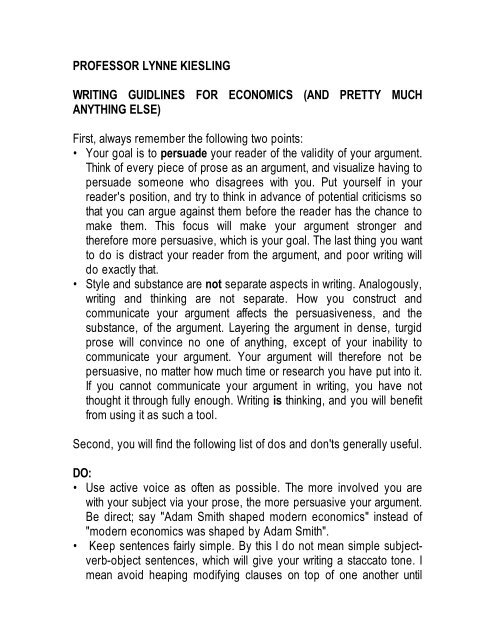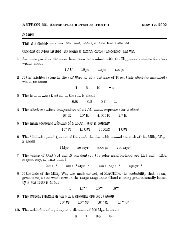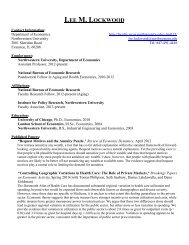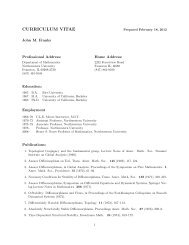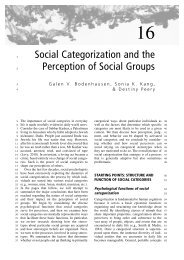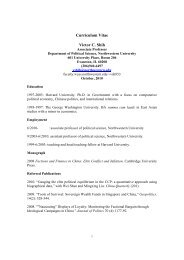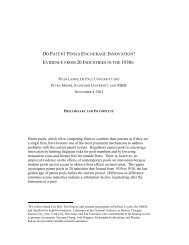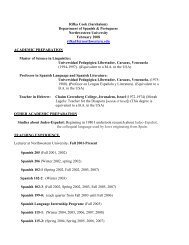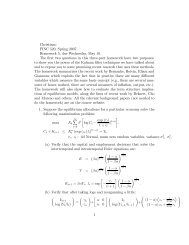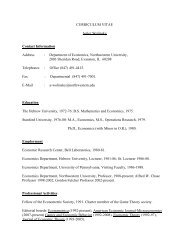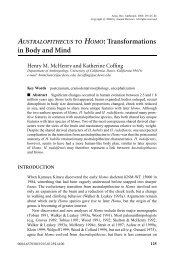Writing guidelines & suggestions (pdf)
Writing guidelines & suggestions (pdf)
Writing guidelines & suggestions (pdf)
You also want an ePaper? Increase the reach of your titles
YUMPU automatically turns print PDFs into web optimized ePapers that Google loves.
PROFESSOR LYNNE KIESLINGWRITING GUIDLINES FOR ECONOMICS (AND PRETTY MUCHANYTHING ELSE)First, always remember the following two points:• Your goal is to persuade your reader of the validity of your argument.Think of every piece of prose as an argument, and visualize having topersuade someone who disagrees with you. Put yourself in yourreader's position, and try to think in advance of potential criticisms sothat you can argue against them before the reader has the chance tomake them. This focus will make your argument stronger andtherefore more persuasive, which is your goal. The last thing you wantto do is distract your reader from the argument, and poor writing willdo exactly that.• Style and substance are not separate aspects in writing. Analogously,writing and thinking are not separate. How you construct andcommunicate your argument affects the persuasiveness, and thesubstance, of the argument. Layering the argument in dense, turgidprose will convince no one of anything, except of your inability tocommunicate your argument. Your argument will therefore not bepersuasive, no matter how much time or research you have put into it.If you cannot communicate your argument in writing, you have notthought it through fully enough. <strong>Writing</strong> is thinking, and you will benefitfrom using it as such a tool.Second, you will find the following list of dos and don'ts generally useful.DO:• Use active voice as often as possible. The more involved you arewith your subject via your prose, the more persuasive your argument.Be direct; say "Adam Smith shaped modern economics" instead of"modern economics was shaped by Adam Smith".• Keep sentences fairly simple. By this I do not mean simple subjectverb-objectsentences, which will give your writing a staccato tone. Imean avoid heaping modifying clauses on top of one another until
your reader loses the main thread of the sentence.• Similarly, keep the subject and the verb in the sentence closetogether. By separating them you create cognitive dissonance in yourreader's brain, which is looking for the word to tell it what the subjectdid, not the modifying conditions under which it did it. Relay thoseconditions to your reader after you have told the reader the action (i.e.the verb). COROLLARY: don't split infinitives. When you do it isdramatic and does make a strong impression (like "to boldly gowhere no one has gone before"), but as a rhetorical device splittinginfinitives is generally distracting and weakens the connectionbetween your subject and your verb. Any lessening of action in yourwriting diminishes its effectiveness.• Check your paragraph breaks to make sure that each paragraphcontains one fully articulated idea. Anything else should be in otherparagraphs. No rule exists for the optimal length of a paragraph, otherthan that it should be long enough to articulate one idea, and onealone.• Use transitions between paragraphs. Communicate to your reader viathese transitions why the point you are making in this paragraphfollows from the previous one, and then at the end why it leads to thenext one. Transitions give your writing polish and make it elegant.They also make your argument easier to follow for the reader, andtherefore more persuasive.DON'T:• Use words like "impact" or "interface" as verbs unless they arecorrect in context. If you are discussing a meteorite striking the earth,"impact" is correct in that context. In other uses, the English languagealready provides a good substitute: "affect". Use it (remembering thatthe noun form is "effect"). The same holds for "interface", which is onlycorrect in computer or audio-video-tele-communications contexts;instead use "interact" or some other good synonym.• Rely on weak phrases, such as "there is," "it seems to be that," "ithas been argued that," "it has been shown that," "evidence has beenfound such that," and so on. These constructions diminish thedirectness of your argument, which therefore decreases its
persuasiveness. The only possible exception comes in thediscussion of, for example, econometric results as evidence in tryingto prove an argument. They don't really prove anything (except thatyou know how to do econometrics); they are consistent with theargument (also see next point).• Which brings up the next point: don't overstate your case. Sayingyou have proven something is misleading when you have really onlyshown that your argument is consistent with reality as we know it.Overstatement will undermine your argument by immediately giving acritical, disagreeing reader an easy way to dismiss your argument.Such a reader could probably come up with contradictory arguments,or even contradictory evidence that you may have omitted (which iswhy you should try to nip potential criticisms in the bud). Once thesecontradictions of your argument surface, your argument loses validity.• Rely on "to be" verbs. (Yes, this point is slightly redundant.) "Is,""are," "was," "were," "am" are empty verbs, truly deviod of meaning.Use them with caution. You obviously cannot eradicate them entirelyfrom your writing, nor should you; but don't use them as a crutch whena more punchy, active verb with personality will inject life into yourargument. Active verbs make an argument more persuasive.COROLLARY: Use passive voice with caution (as mentioned above).In some cases you will want to emphasize the object of a sentence,not the subject. In that case, you are correct to use passive voice.EXAMPLE: "The wager of law has been used in societies outside ofmedieval Europe. During the late nineteenth century, for example, itwas used by the Montenegrans, the Bedouins, and the Albanians."• Use more complicated words or pompous phrases when simplerones convey your meaning just as well.• Use "because" and "since" as synonyms, because they are not."Because" implies a causal relationship, while "since" implies anintertemporal relationship.• Confuse "that" and "which". Use "that" in restrictive clauses and"which" in unrestrictive clauses. EXAMPLE: "The bicycle that is in thegarage is broken" has a different meaning from "The bicycle, which isin the garage, is broken". If you can remove the clause following the"that" or "which" without changing the meaning of the sentence, then it
is an unrestrictive clause and you should use "which". Otherwise, use"that".• Start sentences with "This" unless you follow it with the associatednoun; in other words, don't start sentences with phrases like "Thisindicates that . . .". Instead say, for example, "This evidence indicatesthat . . .". Retaining this connection to your noun serves as a transitionfrom sentence to sentence and makes your writing more elegant, andtherefore more persuasive.© 2003 Lynne Kiesling. All rights reserved.


